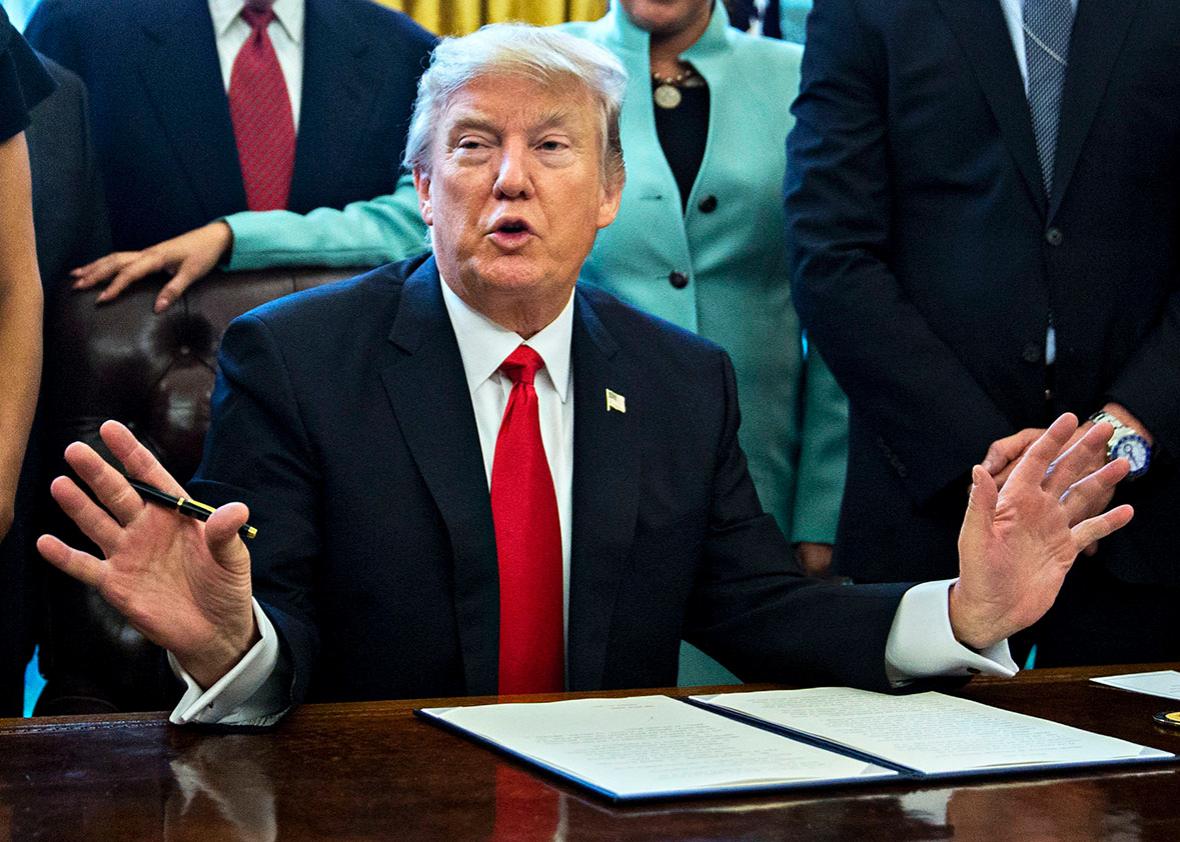Last week, Donald Trump signed an executive order closing America’s borders to refugees from Syria and suspending entrance by citizens from seven majority-Muslim countries. In subsequent days, federal judges across the country responded to lawsuits stemming from the travel ban by ordering the Department of Homeland Security to immediately stop enforcing various aspects of the executive order. In New York’s Eastern District, for instance, Judge Ann Donnelly issued an emergency stay blocking the deportation of people who were already in the process of traveling to the U.S. legally when the executive order went into effect. In the Central District of California, Judge Dolly M. Gee demanded the return of an individual who had already been deported as a result of the order.

United States District Court
By Sunday, reports started coming out that some federal agents from Customs and Border Protection were disregarding the court orders, and continuing to enforce Trump’s travel ban in a way that violated instructions they’d been given by judges. Virginia Attorney General Mark Herring said in a radio interview Monday that his office was looking into reports that CBP agents at Dulles International Airport were blocking people who had been detained under Trump’s ban from speaking to lawyers, in direct violation of an order issued Saturday night by Judge Leonie Brinkema in the Eastern District of Virginia.
The situation has forced observers to reckon with a question that has little or no precedent in American history: What happens when the federal government or its agents refuse to honor a court order handed down by a federal judge? By definition, it has to be different from what happens when, say, a state lawmaker flouts the word of a federal judge, since in the past, such cases have involved the president himself sending in the U.S. Marshals to enforce the law. But who will be on what side if things escalate, and the executive branch itself explicitly and continuously refuses to follow the rulings of the judiciary? At what point does the conflict turn into a full-blown constitutional crisis?
We reached out to a number of eminent constitutional-law scholars and asked them to handicap what will happen next if it appears that the federal government is intent on ignoring the orders of the courts. Most agreed that there is no clear modern precedent for the federal government deliberately defying a court order, and that if it turns out that is indeed what’s happening, we will be entering uncharted waters. But a few others offered some more specific guidance.
“If the reports are true, there are a couple paths to escalate,” said University of Chicago Law School professor William Baude. Before it gets to that point, though, attempts will have to be made by the judges in question to clarify what they intended with their orders and how exactly officials might be in violation of them. “Most likely,” Baude said, “there will be several rounds of brinksmanship before this rises to the level of a constitutional crisis.”
Ari Ezra Waldman, the director of the Innovation Center for Law and Technology at New York Law School, said that if a judge were convinced there was evidence of noncompliance, she could issue a contempt order that imposed certain sanctions on the government. Theoretically, this could take the form of jail time or, less dramatically, fines leveled against individual officials.
The process of figuring out who exactly would be held responsible for noncompliance would not be straightforward. “There would be a contempt hearing, and CBP would likely have to produce records of who up the chain of command is directing them to act,” said Carolyn Shapiro, an associate professor of law and co-director of the Institute on the Supreme Court of the United States at the Illinois Institute of Technology Chicago-Kent College of Law. “If these violations are truly systemic, a judge would want to know who was doing what and where the officers on the ground got those instructions. And those higher-level people could be held in contempt.”
According to Doug Laycock, a professor at the University of Virginia School of Law, the likelihood that we would see fines or jail time even if a contempt order did come down is very slim—in large part because neither the judge, nor the government, has any interest in having the situation devolve to that point. “Judges are much more likely to threaten sanctions than to actually impose them,” Laycock wrote in an email. What typically happens instead—and it’s worth noting that “typically” here refers to much less fraught circumstances than the ones we face today—is that the judge “tries to keep ramping up the pressure, but tries to avoid reaching the point where he has no choice but to send someone to jail.”
That said, there are two special dimensions of the present situation that bear consideration, Laycock added. One is that no one really knows how Trump and his fundamentally unpredictable administration would behave in response to a judicial contempt order. The other is that the court orders stemming from Trump’s travel ban offer the government “very little wiggle room,” meaning that the dance that usually follows a contempt order would be much more constrained than it usually is. As Laycock put it: “This is not like an injunction to reform a prison or desegregate a school system. Let lawyers see the people you’re detaining at Dulles Airport has some unambiguous applications.”
What happens if Trump and his people simply decline to back down, even after a judge gives them an opportunity to comply? According to Waldman, that’s when a judge could call the U.S. Marshals in to enforce the order. In the case of Dulles, that could mean pitting U.S. Marshals against armed agents at airports. “This,” Waldman wrote, “is what sets us up for a darker, dangerous turn.”
For now, our experts said, a confrontation of that nature is not an eventuality worth worrying about. For one thing, as Shapiro points out, both the court orders handed down this weekend and any potential contempt orders would be appealable:
If the government truly thinks it has grounds to appeal the various court orders they would presumably do so. That is the correct procedure—to appeal the [temporary restraining order] if they believe it’s incorrect—not to just violate it—or if they believe they cannot comply, which is not plausible here, to ask for a stay pending appeal and only if absolutely necessary violate it—but also appeal.
Secondly, there’s a small amount of comfort to be drawn from the fact that for all his pugnacity and love of crisis, Trump does not yet enjoy total control of the executive branch. “The people currently in contempt are probably career people and Obama Administration holdovers,” said Laycock in his email. “The Trump people mostly aren’t in place yet.”
Case in point, Acting Attorney General Sally Q. Yates said on Monday that as long as she’s in charge, the Justice Department will not be defending the travel ban in court. Of course, Yates won’t be in charge long, as she’ll be out of a job as soon as her likely successor, Jeff Sessions, is confirmed by the Senate.
Sessions has called Trump’s reasoning on the immigration ban “legitimate,” and according to the Washington Post, he was closely involved in crafting Trump’s position on immigration during the campaign.
Perhaps we should revisit this whole “constitutional crisis” thing once he has taken over.
